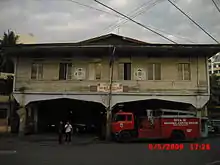San Nicolas Fire Station
San Nicolas Fire Station is among the first fire stations built in the Philippines. It is in San Fernando corner Madrid Streets in San Nicolas, Manila, Philippines.

Background
Fire fighting in the country during the Spanish times was unorganized. The task was usually assigned to street sweepers who would rush to the scene of a fire in case of an alert. However, it was only during the early American period, in August 1901, that firefighting became institutionalized and consequently gave birth to Manila Fire Department established by the Philippine Commission.
The following year, Capt. Hugh Bonner was designated fire chief. Formerly chief of the New York Fire Department, he was credited to have introduced rules and regulations for firemen and a telephone system to receive alarm. Moreover, it was also under his administration that the San Nicolas Fire Station was constructed.
Structure
Built during Bonner's tenure, San Nicolas Fire Station was hailed as one of the firsts to have been established in Manila and was then "considered modern in every aspect," primarily attributed to its sufficiently equipped system in protecting the entire district of san Nicolas, which was then noted for its vulnerability due to commercial warehouses located within the locality.
In his renowned historical book "Manila, My Manila," Philippine National Artist for Literature, Nick Joaquin, describes the station as the "cradle of boxing in the city" since it boasted of a fully functional gymnasium visited by a number of sports enthusiasts.
Restoration
In order to preserve as much of its original structural design, the need to restore the station became eminent and deemed necessary not just structurally but functionally as well. According to SFO1 Edgardo G. Mendoza, currently the non-commissioned officer-in-charge of the fire station, the structure was restored and repainted in 2013 upon the endorsement of the National Historical Commission of the Philippines. The facade and interiors were repainted and replaced with newer materials without sacrificing its original design. In fact, the original fireman poles, windows, rooms, and wooden interior remain intact and true to its original form. "The building remains fully functional despite its century-old existence,"says a report from "Kape at Balita," a GMA News TV's early morning public affairs program.[1]
See also
- Manila Fire District
References
- Kape at Balita (GMA News TV), aired on March 10, 2013